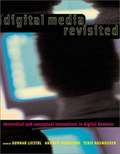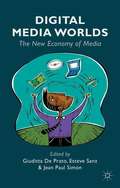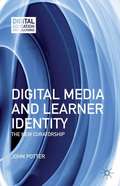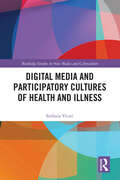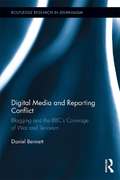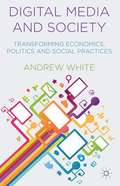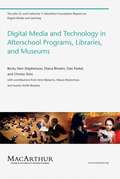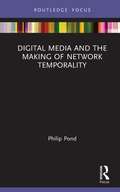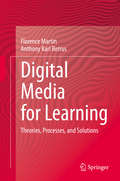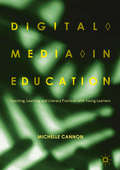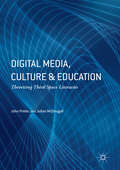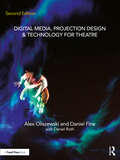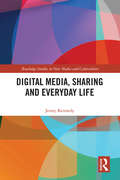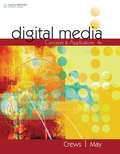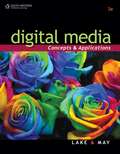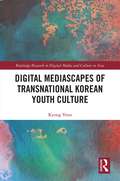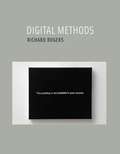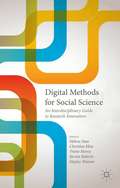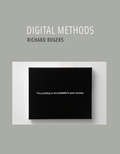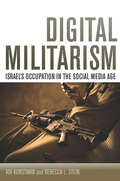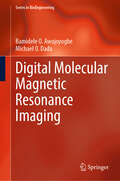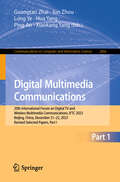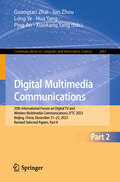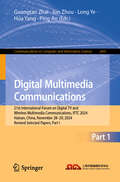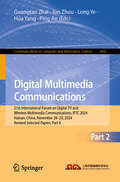- Table View
- List View
Digital Media Revisited: Theoretical and Conceptual Innovations in Digital Domains
by Gunnar Liestøl Andrew Morrison Terje RasmussenArguing that "first encounters" have already applied traditional theoretical and conceptual frameworks to digital media, the contributors to this book call for "second encounters," or a revisiting. Digital media are not only objects of analysis but also instruments for the development of innovative perspectives on both media and culture. Drawing on insights from literary theory, semiotics, philosophy, aesthetics, ethics, media studies, sociology, and education, the contributors construct new positions from which to observe digital media in fresh and meaningful ways. Throughout they explore to what extent interpretation of and experimentation with digital media can inform theory. It also asks how our understanding of digital media can contribute to our understanding of social and cultural change. The book is organized in four sections: Education and Interdisciplinarity, Design and Aesthetics, Rhetoric and Interpretation, and Social Theory and Ethics. The topics include the effects on reading of the multimodal and multisensory aspects of the digital environment, the impact of practice on the medium of theory, how digital media are dissolving the boundaries between leisure and work, and the impact of cyberspace on established ethical principles.
Digital Media Worlds
by Giuditta De Prato Esteve Sanz Jean Paul SimonDigital Media Worlds tracks the evolution of the media sector on its way toward a digital world. It focuses on core economic and management issues (cost structures, value network chain, business models) in industries such as book publishing, broadcasting, film, music, newspaper and video game.
Digital Media and Learner Identity
by John PotterDrawing on research into autobiographical video production by young learners to present a theory of curatorship and new media, this work explores facets of literacy and identity theory which provided the initial frames for examining the work and shows how 'curatorship' works as a metaphor for new cultural and literacy practices.
Digital Media and Participatory Cultures of Health and Illness (Routledge Studies in New Media and Cyberculture)
by Stefania VicariThis book looks at the complex scenario of platforms, practices, and content of contemporary digital communication to map and interpret emerging forms of digitally enhanced health activism. The everyday use of digital and social media platforms has major implications for the production, seeking, and sharing of health information, and raises important questions about the dynamics of health peer support, power relations, trust, privacy, and the quality of health information disseminated across these platforms. This book navigates contemporary forms of participation that develop through mundane digital practices, like tweeting about the latest pandemic news or keeping track of our daily runs with Fitbit or Strava. In doing so, it explores both radical activist practices and more ordinary forms of participation that can gradually lead to social and/or cultural changes in how we understand health and illness. While drawing upon digital media studies and the sociology of health and illness, the book offers theoretical and methodological insights from a decade of empirical research of digital uses that span from digital health advocacy to illness-focused social media practices. Accessible and engaging, the book is ideal for scholars and students interested in digital media, digital activism, health activism and digital health, as well as areas of media and communication and sociology.
Digital Media and Reporting Conflict: Blogging and the BBC’s Coverage of War and Terrorism (Routledge Research in Journalism #6)
by Daniel BennettThis book explores the impact of new forms of online reporting on the BBC’s coverage of war and terrorism. Informed by the views of over 100 BBC staff at all levels of the corporation, Bennett captures journalists’ shifting attitudes towards blogs and internet sources used to cover wars and other conflicts. He argues that the BBC’s practices and values are fundamentally evolving in response to the challenges of immediate digital publication. Ongoing challenges for journalism in the online media environment are identified: maintaining impartiality in the face of calls for more open personal journalism; ensuring accuracy when the power of the "former audience" allows news to break at speed; and overcoming the limits of the scale of the BBC’s news operation in order to meet the demands to present news as conversation. While the focus of the book is on the BBC’s coverage of war and terrorism, the conclusions are more widely relevant to the evolving practice of journalism at traditional media organizations as they grapple with a revolution in publication.
Digital Media and Society
by Andrew WhiteReferencing key contemporary debates on issues like surveillance, identity, the global financial crisis, the digital divide and Internet politics, Andrew White provides a critical intervention in discussions on the impact of the proliferation of digital media technologies on politics, the economy and social practices.
Digital Media and Technology in Afterschool Programs, Libraries, and Museums
by Anne Balsamo Christo Sims Becky Herr Stephenson Dan Perkel Maura Klosterman Susana Smith Bautista Diana RhotenDigital media and technology have become culturally and economically powerful parts of contemporary middle-class American childhoods. Immersed in various forms of digital media as well as mobile and Web-based technologies, young people today appear to develop knowledge and skills through participation in media. This MacArthur Report examines the ways in which afterschool programs, libraries, and museums use digital media to support extracurricular learning. It investigates how these three varieties of youth-serving organizations have incorporated technological infrastructure and digital practices into their programs; what types of participation and learning digital practices support; and how research in digital media and learning can contribute to better integration of technology within and across these organizations. The authors review a range of programs (including the long-running Computer Clubhouse movement, established in 1993 in partnership with MIT's Media Lab), and then use the idea of "media ecologies" to investigate the role that digital media play (or could play) in these "intermediary spaces for learning." They call for less anecdotal, more empirical and methodologically sound studies to help us understand the affordances of digital media for learning within and across these programs; for research focused on the relationship between digital media and the effectiveness of youth-serving organizations; and for further study of schools within childhood media ecologies.
Digital Media and the Making of Network Temporality
by Philip PondThis book presents an exciting new theory of time for a world built on hyper-fast digital media networks. Computers have changed the human social experience enormously. We’re becoming familiar with many of the macro changes, but we rarely consider the complex, underlying mechanics of how a technology interacts with our social, political and economic worlds. And we cannot explain how the mechanics of a technology are being translated into social influence unless we understand the role of time in that process. Offering an original reconsideration of temporality, Philip Pond explains how super-powerful computers and global webs of connection have remade time through speed. The book introduces key developments in network time theory and explains their importance, before presenting a new model of time which seeks to reconcile the traditionally separate subjective and objective approaches to time theory and measurement.
Digital Media for Learning: Theories, Processes, and Solutions
by Florence Martin Anthony Karl BetrusThis book provides a comprehensive overview on the theories, processes, and solutions relevant to effectively creating, using, and managing digital media in a variety of instructional settings. In the first section of the book, the authors provide an overview of the theories, development models, and principles of learning with digital media. In the second section, the authors detail various digital media solutions, including: Instructional Videos, Instructional Simulations and Games, Online Learning, Mobile Learning, and Emerging Learning Technologies. Overall, this book emphasizes the theoretical principles for learning with digital media and processes to design digital media solutions in various instructional settings. The readers are also provided with multiple case studies from real world projects in various instructional settings.
Digital Media in Education: Teaching, Learning and Literacy Practices with Young Learners
by Michelle CannonThis book argues for dynamic and relevant school experiences for primary and early secondary learners that embed digital media production. It proposes a vision of literacy that combines new technologies with multiple modes of meaning-making. Drawing on theories related to cultural studies, media literacy, anthropology, and creativity, the author explores learning strategies with digital media based on an empowering, values-driven framework. The book advances innovative teaching methods, critiquing educational ‘reforms’ that marginalise media and fail to engage with the complex tensions and textures of modern pedagogy. Positioning film and media-making as vital practices in schools that nurture the skills, dispositions and competencies of modern literacy, the model foregrounds connections between human agency, cognition, and creative practice. This innovative book will appeal to students and scholars of creativity, digital media production, primary education and literacy.
Digital Media, Culture and Education
by John Potter Julian McdougallThis book provides a critical commentary on key issues around learning in the digital age in both formal and informal educational settings. The book presents research and thinking about new dynamic literacies, porous expertise, digital making/coding/remixing, curation, storying in digital media, open learning, the networked educator and a number of related topics; it further addresses and develops the notion of a 'third space literacies' in contexts for learning. The book takes as its starting point the idea that an emphasis on technology and media, as part of material culture and lived experience, is much needed in the discussion of education, along with a criticality which is too often absent in the discourse around technology and learning. It constructs a narrative thread and a critical synthesis from a sociocultural account of the memes and stereotypical positions around learning, media and technology in the digital age, and will be of great interest to academics interested in the mechanics of learning and the effects of technology on the education experience. It closes with a conversation as a reflexive 'afterword' featuring discussion of the key issues with, amongst others, Neil Selwyn and Cathy Burnett.
Digital Media, Projection Design, and Technology for Theatre
by Alex Oliszewski Daniel Fine Daniel RothDigital Media, Projection Design, & Technology for Theatre, Second Edition comprehensively details the integration of digital media and projections in theatre and live performance, providing foundational skills, best practices, and real-world applications and considerations.The book provides readers with an overview of the professional field, including current industry standards and workflows for digital media/projection design, its related aesthetics, techniques, and technologies. A practical taxonomy of digital media and how we create meaning through its use on the theatrical stage along with the essential tools and techniques for creating and executing digital content are covered. Readers are introduced to the fundamentals of creating and executing digital content, including photography and still images, generative AI, video, animation, real-time effects, generative art, data, and interactive digital media. The book also details the types and use of industry-standard equipment, including media servers, projectors, projection surfaces, emissive displays, cameras, sensors, and more. It guides readers through technical tasks, such as programming media servers; converging and blending projectors; projection mapping; calculating surface brightness/luminance, screen size, and throw distance; and more, making this a complete guide to digital media and projection design today. The second edition is updated with new content throughout and two new chapters addressing the latest technologies and trends in virtual performance, motion capture, generative AI, and VR/AR. Ten new case studies from diverse practitioners have been added, and the book is restructured with shorter chapters for easier navigation and reference.This book serves well as a main or supplemental textbook for courses in projection design, theatre, and digital media design. It is also useful for emerging practitioners.Sample assets and interviews with leading projection designers are available for download at www.routledge.com/9781032302157.
Digital Media, Sharing, and Everyday Life (Routledge Studies in New Media and Cyberculture)
by Jenny KennedySharing is an important form of communication, and one that is championed in contemporary digital culture. This book asks what is sharing, and what roles do our digital devices and the platforms we use such as Facebook and Twitter play in these practices? Drawing on original empirical data, this timely book reveals detailed descriptions of the symbolic processes of sharing in digital culture and the complexities that arise in them. It draws out the relationship of sharing to privacy and control, the laboured strategies and boundaries of reciprocation, and our relationships with the technologies which mediate sharing practices.
Digital Media: Concepts And Applications (Digital Video Production Ser.)
by Catherine Skintik Karen May Tena B. CrewsNIMAC-sourced textbook
Digital Media: Concepts and Applications (3rd Edition)
by Susan E. L. Lake Karen MayDIGITAL MEDIA, CONCEPTS AND APPLICATIONS, 3E prepares students for the workplace by teaching them to use business-standard software applications to complete projects and solve problems. The non-software-specific approach gives students a strong foundation in the concepts and practices of digital multimedia and allows the text to focus on the more creative end of business technology.
Digital Mediascapes of Transnational Korean Youth Culture (Routledge Research in Digital Media and Culture in Asia)
by Kyong YoonDrawing on vivid ethnographic field studies of youth on the transnational move, across Seoul, Toronto, and Vancouver, this book examines transnational flows of Korean youth and their digital media practices. This book explores how digital media are integrated into various forms of transnational life and imagination, focusing on young Koreans and their digital media practices. By combining theoretical discussion and in depth empirical analysis, the book provides engaging narratives of transnational media fans, sojourners, and migrants. Each chapter illustrates a form of mediascape, in which transnational Korean youth culture and digital media are uniquely articulated. This perceptive research offers new insights into the transnationalization of youth cultural practices, from K-pop fandom to smartphone-driven storytelling. A transnational and ethnographic focus makes this book the first of its kind, with an interdisciplinary approach that goes beyond the scope of existing digital media studies, youth culture studies, and Asian studies. It will be essential reading for scholars and students in media studies, migration studies, popular culture studies, and Asian studies.
Digital Methods
by Richard RogersIn Digital Methods, Richard Rogers proposes a methodological outlook for social and cultural scholarly research on the Web that seeks to move Internet research beyond the study of online culture. It is not a toolkit for Internet research, or operating instructions for a software package; it deals with broader questions. How can we study social media to learn something about society rather than about social media use? How can hyperlinks reveal not just the value of a Web site but the politics of association? Rogers proposes repurposing Web-native techniques for research into cultural change and societal conditions. We can learn to reapply such "methods of the medium" as crawling and crowd sourcing, PageRank and similar algorithms, tag clouds and other visualizations; we can learn how they handle hits, likes, tags, date stamps, and other Web-native objects. By "thinking along" with devices and the objects they handle, digital research methods can follow the evolving methods of the medium. Rogers uses this new methodological outlook to examine the findings of inquiries into 9/11 search results, the recognition of climate change skeptics by climate-change-related Web sites, the events surrounding the Srebrenica massacre according to Dutch, Serbian, Bosnian, and Croatian Wikipedias, presidential candidates' social media "friends," and the censorship of the Iranian Web. With Digital Methods, Rogers introduces a new vision and method for Internet research and at the same time applies them to the Web's objects of study, from tiny particles (hyperlinks) to large masses (social media).
Digital Methods for Social Science: An Interdisciplinary Guide To Research Innovation
by Christine Hine Steven Roberts Helene Snee Yvette Morey Hayley WatsonThis timely book inspires researchers to deploy relevant, effective, innovative digital methods. It explores the relationship of such methods to 'mainstream' social science; interdisciplinarity; innovations in digital research tools; the opportunities (and challenges) of digital methods in researching social life; and digital research ethics.
Digital Methods: Digital Methods (The\mit Press Ser. #339)
by Richard RogersA proposal to repurpose Web-native techniques for use in social and cultural scholarly research.In Digital Methods, Richard Rogers proposes a methodological outlook for social and cultural scholarly research on the Web that seeks to move Internet research beyond the study of online culture. It is not a toolkit for Internet research, or operating instructions for a software package; it deals with broader questions. How can we study social media to learn something about society rather than about social media use? Rogers proposes repurposing Web-native techniques for research into cultural change and societal conditions. We can learn to reapply such “methods of the medium” as crawling and crowd sourcing, PageRank and similar algorithms, tag clouds and other visualizations; we can learn how they handle hits, likes, tags, date stamps, and other Web-native objects. By “thinking along” with devices and the objects they handle, digital research methods can follow the evolving methods of the medium. Rogers uses this new methodological outlook to examine such topics as the findings of inquiries into 9/11 search results, the recognition of climate change skeptics by climate-change-related Web sites, and the censorship of the Iranian Web. With Digital Methods, Rogers introduces a new vision and method for Internet research and at the same time applies them to the Web's objects of study, from tiny particles (hyperlinks) to large masses (social media).
Digital Militarism: Israel's Occupation in the Social Media Age
by Rebecca L. Stein Adi KuntsmanIsrael's occupation has been transformed in the social media age. Over the last decade, military rule in the Palestinian territories grew more bloody and entrenched. In the same period, Israelis became some of the world's most active social media users. In Israel today, violent politics are interwoven with global networking practices, protocols, and aesthetics. Israeli soldiers carry smartphones into the field of military operations, sharing mobile uploads in real-time. Official Israeli military spokesmen announce wars on Twitter. And civilians encounter state violence first on their newsfeeds and mobile screens. Across the globe, the ordinary tools of social networking have become indispensable instruments of warfare and violent conflict. This book traces the rise of Israeli digital militarism in this global context-both the reach of social media into Israeli military theaters and the occupation's impact on everyday Israeli social media culture. Today, social media functions as a crucial theater in which the Israeli military occupation is supported and sustained.
Digital Molecular Magnetic Resonance Imaging (Series in BioEngineering)
by Michael O. Dada Bamidele O. AwojoyogbeThis book pushes the limits of conventional MRI visualization methods by completely changing the medical imaging landscape and leads to innovations that will help patients and healthcare providers alike. It enhances the capabilities of MRI anatomical visualization to a level that has never before been possible for researchers and clinicians. The computational and digital algorithms developed can enable a more thorough understanding of the intricate structures found within the human body, surpassing the constraints of traditional 2D methods. The Physics-informed Neural Networks as presented can enhance three-dimensional rendering for deeper understanding of the spatial relationships and subtle abnormalities of anatomical features and sets the stage for upcoming advancements that could impact a wider range of digital heath modalities. This book opens the door to ultra-powerful digital molecular MRI powered by quantum computing that can perform calculations that would take supercomputers millions of years.
Digital Multimedia Communications: 20th International Forum on Digital TV and Wireless Multimedia Communications, IFTC 2023, Beijing, China, December 21–22, 2023, Revised Selected Papers, Part I (Communications in Computer and Information Science #2066)
by Jun Zhou Xiaokang Yang Guangtao Zhai Ping An Hua Yang Long YeThis book constitutes the refereed proceedings of the 20th International Forum on Digital Multimedia Communication, IFTC 2023, held in Beijing, China, December 21–22, 2023. The 57 full papers included in this book were carefully reviewed and selected from 150 submissions. They were organized in topical sections as follows: CCIS 2066: Image Processing, Media Computing, Metaverse and Virtual Reality, and Multimedia Communication. CCIS 2067: Quality Assessment, Source Coding, and Application of AI.
Digital Multimedia Communications: 20th International Forum on Digital TV and Wireless Multimedia Communications, IFTC 2023, Beijing, China, December 21–22, 2023, Revised Selected Papers, Part II (Communications in Computer and Information Science #2067)
by Jun Zhou Xiaokang Yang Guangtao Zhai Ping An Hua Yang Long YeThis book constitutes the refereed proceedings of the 20th International Forum on Digital Multimedia Communication, IFTC 2023, held in Beijing, China, December 21–22, 2023. The 57 full papers included in this book were carefully reviewed and selected from 150 submissions. They were organized in topical sections as follows: CCIS 2066: Image Processing, Media Computing, Metaverse and Virtual Reality, and Multimedia Communication. CCIS 2067: Quality Assessment, Source Coding, and Application of AI.
Digital Multimedia Communications: 21st International Forum on Digital TV and Wireless Multimedia Communications, IFTC 2024, Hainan, China, November 28–29, 2024, Revised Selected Papers, Part I (Communications in Computer and Information Science #2441)
by Jun Zhou Guangtao Zhai Ping An Hua Yang Long YeThis volume contains 28 selected papers presented at IFTC 2024: 21st International Forum of Digital Multimedia Communication, held in Lingshui, Hainan, China, on November 28-29, 2024. The 55 full papers included in this 2-volume set were carefully reviewed and selected from 146 submissions. They were organized in topical sections as follows: CCIS 2441: Affective Computing, Graphics & Image Processing for Virtual Reality, Large Language Models, Multimedia Communication, Application of Deep Learning and Video Analysis. CCIS 2442: Human and Interactive Media, Image Processing, Quality Assessment and Source Coding.
Digital Multimedia Communications: 21st International Forum on Digital TV and Wireless Multimedia Communications, IFTC 2024, Hainan, China, November 28–29, 2024, Revised Selected Papers, Part II (Communications in Computer and Information Science #2442)
by Jun Zhou Guangtao Zhai Ping An Hua Yang Long YeThis volume contains 27 selected papers presented at IFTC 2024: 21st International Forum of Digital Multimedia Communication, held in Lingshui, Hainan, China, on November 28-29, 2024. The 55 full papers included in this 2-volume set were carefully reviewed and selected from 146 submissions. They were organized in topical sections as follows: CCIS 2441: Affective Computing, Graphics & Image Processing for Virtual Reality, Large Language Models, Multimedia Communication, Application of Deep Learning and Video Analysis. CCIS 2442: Human and Interactive Media, Image Processing, Quality Assessment and Source Coding.
